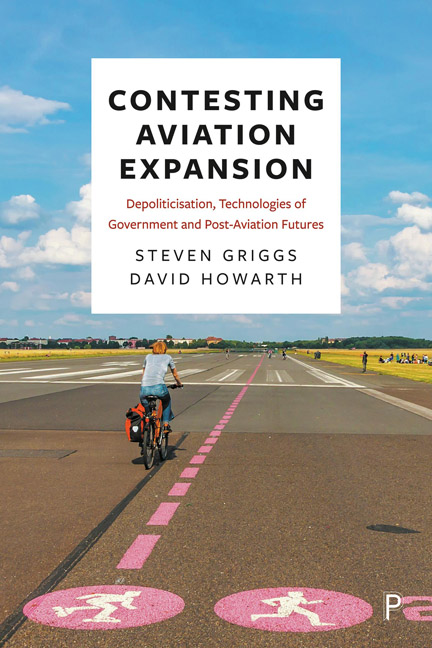 Contesting Aviation Expansion
Contesting Aviation Expansion Book contents
- Frontmatter
- Contents
- List of figures and tables
- List of abbreviations
- Acknowledgements
- Introduction: Problematising the dilemmas of UK airport expansion – puzzles and research strategies
- 1 Depoliticisation, discourse and policy hegemony
- 2 Governing by numbers: fantasies of forecasting, ‘predict and provide’ and the technologies of government
- 3 The anatomy of an expert Commission: Howard Davies, rhetorical reframing and the performance of leadership
- 4 Repoliticising aviation policy: law, planning and persistent activism
- 5 Extreme turbulence: problematisations, multiple crises and new demands
- 6 ‘What if…?’ A manifesto for the green transformation of aviation
- Conclusion: Staying grounded
- Notes
- References
- Index
4 - Repoliticising aviation policy: law, planning and persistent activism
Published online by Cambridge University Press: 18 January 2024
- Frontmatter
- Contents
- List of figures and tables
- List of abbreviations
- Acknowledgements
- Introduction: Problematising the dilemmas of UK airport expansion – puzzles and research strategies
- 1 Depoliticisation, discourse and policy hegemony
- 2 Governing by numbers: fantasies of forecasting, ‘predict and provide’ and the technologies of government
- 3 The anatomy of an expert Commission: Howard Davies, rhetorical reframing and the performance of leadership
- 4 Repoliticising aviation policy: law, planning and persistent activism
- 5 Extreme turbulence: problematisations, multiple crises and new demands
- 6 ‘What if…?’ A manifesto for the green transformation of aviation
- Conclusion: Staying grounded
- Notes
- References
- Index
Summary
In presenting the findings of the AC to the public at the beginning of July 2015, Howard Davies expressed his ‘hope that within weeks, if not months, [ministers would] decide to go ahead [with expansion]’ (Davies, 2015a). But these hopes were soon dashed. Over four and a half years, two Prime Ministers and four governments later, his efforts to deliver an ‘evidence-based consensus’ were still being challenged in the courts. In February 2020, in a landmark judgement, the Court of Appeal ruled that the ANPS and its plans for a third runway at Heathrow were ‘illegal’ because the government had failed to take adequate account of the impact of aviation emissions from expansion on its commitments under the 2015 Paris Agreement and the UK target of net zero carbon emissions by 2050 (Carrington, 2020). The Conservative government, led by Boris Johnson, who was a strong opponent of Heathrow expansion when Mayor of London, made it clear that it would not appeal the ruling, and so it was left to Heathrow Airport Limited (HAL) to challenge the verdict (Xie and Baynes, 2020). The proposed third runway was effectively stalled.
This chapter analyses the complex and messy dynamics of politicisation, depoliticisation and repoliticisation, which punctuated the aftermath of the AC, as rival discourse coalitions competed for policy hegemony. In the post-Brexit context, we argue that successive Conservative governments struggled to perpetuate the dominant social logic of ‘predict and provide’, as they sought in the face of sustained political opposition to deliver airport expansion by depoliticising aviation's contribution to climate change, air pollution and noise. The chapter also shows how the opponents of expansion exploited and re-politicised the novel arenas and technologies, which were designed and developed by government to remove the issue of aviation expansion from the political domain. Here we explore how the February 2020 ruling of the Court of Appeal, and the successful legal challenge to the third runway, transformed the Planning Act (PA) (2008) and Climate Change Act (CCA) (2008) and the 2015 Paris Agreement into ‘counter-technologies’, effectively redefining the courts as a sphere of resistance. In exploiting the new technologies and spaces of planning and climate change policy, campaigners were able to use the law courts and the process of judicial review to challenge government and open up new spaces for citizen protest and political resistance.
- Type
- Chapter
- Information
- Contesting Aviation ExpansionDepoliticisation, Technologies of Government and Post-Aviation Futures, pp. 103 - 129Publisher: Bristol University PressPrint publication year: 2023
